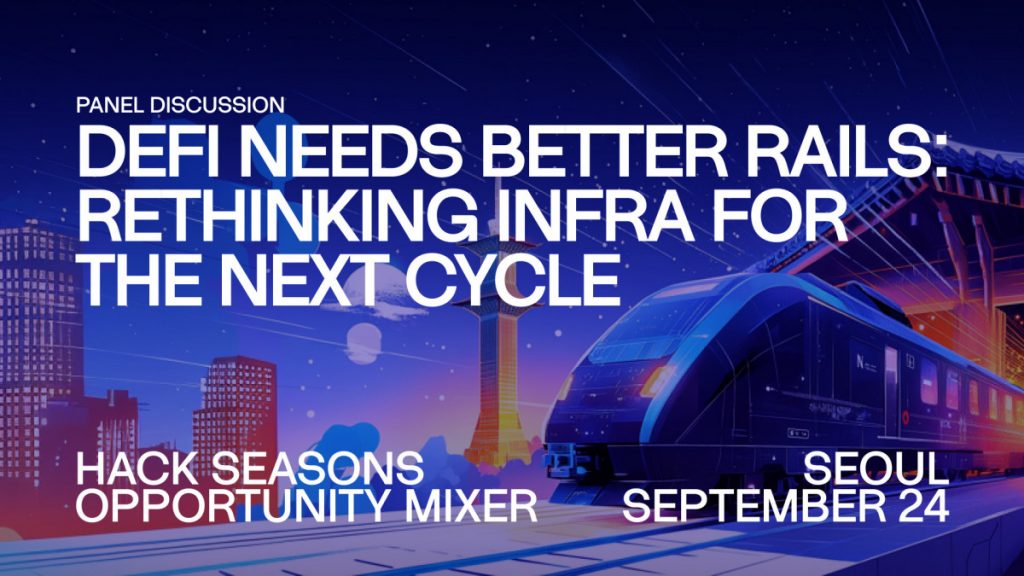Exploring Web3’s Next Frontier At Hack Seasons Seoul: From RWA Integration To Mass Adoption Through Simplified Infrastructure


In Brief
At the Hack Seasons Opportunity Mixer in Seoul, industry leaders discussed how infrastructure, Layer 2s, RWA tokenization, and more will drive the next cycle of DeFi.

At the end of September, the Hack Seasons Opportunity Mixer took place in Seoul, bringing together leading figures from the blockchain, Web3, and digital finance sectors to discuss emerging trends and future developments. Among the event’s key sessions was a panel titled “DeFi Needs Better Rails: Rethinking Infrastructure for the Next Cycle,” moderated by Marcos Viriato, CEO of Parfin. The discussion featured insights from prominent participants, including Jonathan Sam, Head of APAC at Utila; Fred Hsu, CEO of D3; Adele Hu, Head of DeFi and RWA at Taiko; and Ben Fisch, CEO and Co-founder of Espresso Systems. Panelists explored how advancements in infrastructure are influencing the next generation of scalable and resilient decentralized finance (DeFi).
The conversation began with an examination of the evolving role of domain name platforms in the upcoming DeFi cycle. Speaker from D3 highlighted that domain systems have existed for more than three decades, and the most significant factor driving progress in this area is the establishment of trust. Once that foundation is secured, it enables the creation of new DeFi primitives and financial applications. The discussion also touched on the emergence of “DomainFi,” a growing sector focused on integrating DeFi principles with domain management. Panelists emphasized that trust remains essential for enabling any form of asset to transition effectively on-chain.
The discussion also examined the growing trend of Layer 2 networks being developed with real-world assets (RWAs) in mind, focusing on how projects are competing for liquidity and the mechanisms they employ to attract it. Networks such as Taiko are expanding their scope to incorporate RWAs, positioning themselves as key infrastructure layers for tokenized finance. One of the primary challenges facing RWA integration is regulatory risk, which extends to the infrastructure level itself. Large institutions often remain cautious about tokenizing assets on chains that rely on a single point of failure. By adopting based rollup structures, networks can leverage Ethereum’s security and decentralization to provide solutions that are more aligned with institutional compliance expectations. This approach has the potential to enable broader on-chain RWA integrations and serve as a foundation for institutional adoption in the coming cycle.
The conversation then turned to the future of Layer 2 development and its role in improving transaction finality. Panelists noted that creating protocols that deepen liquidity benefits the entire ecosystem by incentivizing participation. They compared this to traditional finance, where institutions connect to established networks such as Visa to achieve broad compatibility. Despite significant progress, DeFi still mirrors some of the fragmentation seen in traditional finance, with liquidity distributed across numerous exchanges and isolated pools. In the decentralized space, this fragmentation is further amplified by the existence of multiple chains that do not share liquidity seamlessly.
Speakers emphasized that no single blockchain currently possesses the scalability to support every platform, highlighting the necessity for secure, real-time interoperability among different networks. This need has not yet been fully addressed in the industry. Espresso, as discussed, provides a framework for achieving fast transaction finality and enhanced interoperability across chains. Its infrastructure not only enables secure custody of assets such as ETH but also facilitates real-time communication between networks, contributing to the unification of liquidity across the broader ecosystem.
Industry Leaders Outline Next Frontier For Web3: From Streamlined Web2 Transition To Real-World Blockchain Integration
The discussion then shifted toward identifying what is necessary to achieve mass adoption in the upcoming cycles and defining the next frontier for Web3 development. Speakers emphasized that simplification is key—mass adoption will depend on making it easy for existing Web2 applications to transition into Web3 environments without requiring a complete redesign. The prevailing misconception that systems must be rebuilt from scratch to become blockchain-based continues to create friction. In reality, most applications can be integrated directly onto the blockchain with minimal restructuring. Overcoming this perception and streamlining the transition process were identified as crucial steps toward mainstream adoption.
Participants also highlighted the importance of focusing on practical problems and developing real, sustainable business models rather than relying on abstract concepts or technical jargon. The conversation further touched on the role of institutional and governmental engagement, noting that for large-scale adoption to occur, support must extend beyond startups to include enterprises and public institutions. Platforms such as Utila were cited as examples of solutions enabling organizations to securely custody digital assets and conduct operations efficiently within the Web3 ecosystem.
From Taiko’s perspective, the current market cycle has shown that major institutions are increasingly seeking not only cryptocurrency exposure but also blockchain integration in their operational frameworks. This includes areas such as RWA tokenization, supply chain management, and private credit. While tokenization itself has become less of a technical challenge, the primary bottleneck now lies in distribution and liquidity fragmentation across DeFi. Without consolidated liquidity, institutional participation will remain limited, and both retail and corporate engagement will struggle to reach meaningful scale. A unified liquidity environment is therefore considered essential for the next stage of RWA development.
The conversation also addressed the concept of the “killer app” within the crypto space, using stablecoins as a historical example of a breakthrough use case. Speakers discussed what the next major driver might be, suggesting that mass adoption will likely come from applications people use in everyday life or from institutional systems leveraging blockchain for backend settlement and cross-border transactions. The ultimate goal is to make blockchain technology an integral part of routine financial processes, whether directly for consumers or behind the scenes for enterprises.
Additional perspectives included the potential of real estate tokenization as a transformative use case, offering tangible solutions to real-world inefficiencies. The session concluded with reflections on the importance of evolving regulatory frameworks that encourage innovation while providing clarity and protection for participants. Panelists expressed optimism for the coming year, noting that the next cycle will likely be defined by improved infrastructure, greater interoperability, and a more mature balance between compliance and decentralization.
Disclaimer
In line with the Trust Project guidelines, please note that the information provided on this page is not intended to be and should not be interpreted as legal, tax, investment, financial, or any other form of advice. It is important to only invest what you can afford to lose and to seek independent financial advice if you have any doubts. For further information, we suggest referring to the terms and conditions as well as the help and support pages provided by the issuer or advertiser. MetaversePost is committed to accurate, unbiased reporting, but market conditions are subject to change without notice.
About The Author
Alisa, a dedicated journalist at the MPost, specializes in cryptocurrency, zero-knowledge proofs, investments, and the expansive realm of Web3. With a keen eye for emerging trends and technologies, she delivers comprehensive coverage to inform and engage readers in the ever-evolving landscape of digital finance.
More articles

Alisa, a dedicated journalist at the MPost, specializes in cryptocurrency, zero-knowledge proofs, investments, and the expansive realm of Web3. With a keen eye for emerging trends and technologies, she delivers comprehensive coverage to inform and engage readers in the ever-evolving landscape of digital finance.



















































